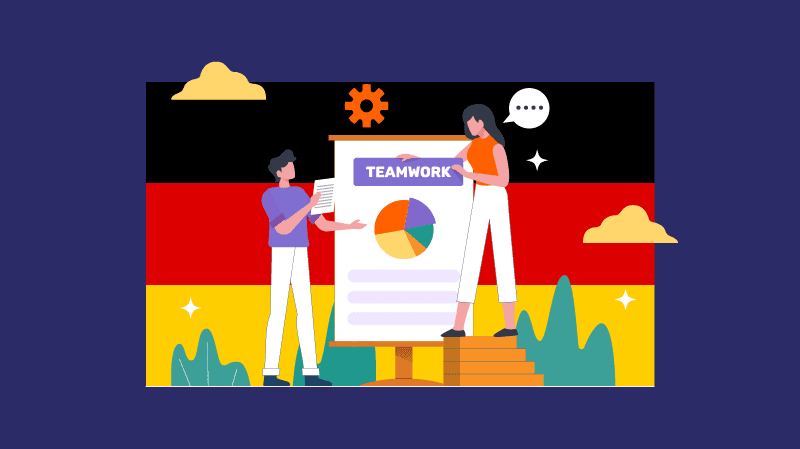
Germany has long been a popular destination for immigrants due to its strong economy, advanced social system, and the opportunities it offers for a high standard of living. However, while the country provides a welcoming environment for immigrants, many face challenges, particularly in the workplace. Understanding these challenges is crucial not only for policymakers but also for businesses looking to create a more inclusive and productive work environment. This article aims to delve into the common barriers and difficulties immigrants encounter in the German workplace, covering everything from language barriers to career advancement opportunities.
1. Language Barriers
One of the most significant challenges immigrants face in the German workplace is the language barrier. Although English is widely spoken, German is the primary language of business and daily communication. This poses a problem, especially for immigrants who have not yet achieved proficiency in German.
- Impact on Communication: Misunderstandings and miscommunications can occur if an employee is not fluent, leading to errors in task completion and a lack of collaboration.
- Professional Growth: A lack of German proficiency can limit career advancement opportunities, as many managerial and client-facing roles require advanced language skills.
- Workplace Integration: Language barriers can hinder an immigrant’s ability to socialize with colleagues, participate in meetings, and fully integrate into the work culture, which may result in a feeling of isolation.
To address this, companies should consider offering German language training and fostering an inclusive environment where employees feel comfortable improving their language skills.
2. Recognition of Qualifications and Skills
In Germany, the recognition of foreign qualifications is a critical issue for many immigrants. Often, their educational and professional qualifications are not automatically recognized, making it challenging for skilled professionals to find jobs that match their expertise.
- Bureaucratic Hurdles: The process of getting qualifications recognized can be time-consuming and bureaucratic, requiring multiple documents and sometimes expensive translations.
- Skill Underutilization: Many immigrants find themselves taking on jobs for which they are overqualified, leading to skill underutilization and frustration. For instance, a trained engineer from another country might end up working in a non-technical job because their degree is not recognized.
- Solutions: Germany has programs to help immigrants navigate the recognition process, but awareness and access remain limited. Employers should also be open to evaluating skills and competencies rather than just formal qualifications.
3. Cultural Differences and Workplace Integration
Cultural differences can create misunderstandings and discomfort in the workplace. These differences range from communication styles and approaches to work-life balance to expectations regarding hierarchy and authority.
- Communication Styles: In Germany, direct communication is valued. This can come off as blunt or rude to individuals from cultures where indirect communication is the norm.
- Work Ethic and Punctuality: The German work culture emphasizes punctuality, precision, and a structured approach to problem-solving. Immigrants may struggle to adapt to these norms if they come from countries with a more relaxed attitude toward time and deadlines.
- Hierarchy and Decision Making: In German companies, decisions are often made in a hierarchical manner, which might be different from the collaborative or consensus-driven models in other countries.
These cultural differences can sometimes lead to conflict or a sense of exclusion for immigrants. To ease these challenges, intercultural training and mentorship programs can be valuable tools in helping both immigrants and native employees understand and respect each other’s work styles.
4. Discrimination and Bias
Despite Germany’s efforts to promote diversity, discrimination remains a challenge for many immigrants. This can manifest in various forms, such as unconscious bias during the hiring process, limited opportunities for advancement, or even everyday microaggressions.
- Hiring Bias: Immigrants may face discrimination based on their names, appearance, or place of origin. Research has shown that applicants with foreign-sounding names are less likely to be called for interviews, even when they have the same qualifications as native candidates.
- Workplace Discrimination: Discrimination may continue in the workplace, where immigrants might be overlooked for promotions or more challenging projects.
- Legal Protections: While Germany has strict anti-discrimination laws, enforcing these laws can be difficult, and many immigrants may not be aware of their rights.
Employers need to implement robust anti-discrimination policies, ensure a diverse hiring process, and create an open environment where all employees feel valued.
5. Job Security and Employment Contracts
Immigrants often find themselves in more precarious job positions compared to native Germans. They are more likely to be employed in temporary or part-time positions, which offer less job security and fewer benefits.
- Temporary Contracts: Many immigrants, particularly those who are new to the country, start with temporary or agency work, making it difficult to secure long-term employment.
- Limited Benefits: Part-time or temporary work often comes with fewer benefits, such as health insurance or pension contributions, which are crucial in a country like Germany where social security is tied to employment.
- Barriers to Permanent Employment: Language skills, lack of recognized qualifications, and discrimination can also prevent immigrants from securing permanent employment.
To support immigrants, companies should consider creating clear pathways to permanent positions and providing support for career advancement.
6. Networking and Professional Connections
Networking is an essential component of career growth, but immigrants often lack access to professional networks that native workers might take for granted. Without these networks, it can be harder to learn about job opportunities, get recommendations, or understand industry norms.
- Limited Access: Immigrants might not have connections in their field in Germany, making it difficult to find mentors or sponsors who can help them navigate their careers.
- Cultural and Social Barriers: Language barriers and cultural differences can also make it harder for immigrants to participate in informal networking activities, such as social events or company outings.
Encouraging networking through professional associations, mentoring programs, and community organizations can help bridge this gap and allow immigrants to build the connections they need to succeed.
7. Work-Life Balance and Family Integration
Balancing work with family life can be a particular challenge for immigrants, especially for those with families. The German work culture values a clear separation between work and personal life, but the support structures available to native workers are often not as accessible to immigrants.
- Childcare and Schooling: Immigrants may struggle to find suitable childcare or navigate the German school system, especially if they are not fluent in the language.
- Family Reunification: Immigration laws can make it challenging for some families to join their relatives in Germany, leading to stress and instability, which can impact work performance.
- Support Systems: While Germany offers robust parental leave and family support programs, accessing these benefits can be complicated for those unfamiliar with the system.
Employers can support work-life balance by providing flexible working hours and assisting employees in understanding and accessing the resources available to them.
8. Mental Health and Wellbeing
The stress of adapting to a new country, culture, and work environment can take a toll on an immigrant’s mental health. Factors such as isolation, discrimination, and uncertainty about the future contribute to higher levels of anxiety and depression among immigrants compared to the general population.
- Isolation: The language barrier and cultural differences can make it hard for immigrants to build social connections, leading to feelings of loneliness and isolation.
- Workplace Stress: Adapting to a new work culture, coupled with the pressure to perform and secure stable employment, can be overwhelming.
- Access to Mental Health Services: Many immigrants are unaware of the mental health services available or face linguistic and cultural barriers when seeking help.
Employers should prioritize mental health support by offering counseling services, creating an inclusive work environment, and promoting awareness of mental health resources.
Conclusion
The challenges immigrants face in the German workplace are multifaceted and deeply interconnected. Addressing these issues requires concerted efforts from employers, policymakers, and the immigrants themselves. By offering language support, recognizing foreign qualifications, promoting cultural understanding, and ensuring fair treatment, companies can create a more inclusive and productive workplace. Furthermore, initiatives like mentorship programs, networking opportunities, and mental health support can help immigrants fully integrate into the workforce, allowing them to contribute their skills and perspectives to the German economy.
Through a better understanding of these challenges and implementing thoughtful solutions, Germany can continue to build a diverse, dynamic, and competitive workforce that benefits everyone.


